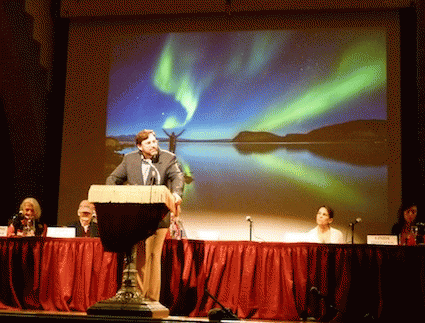
Tom Butler of the Foundation for Deep Ecology speaking at the Techno-Utopianism and the Fate of the Earth Conference in NYC on Oct. 25, 2014
(Image by Scott Harris) Details DMCA
As the "Techno-Utopianism and the Fate of the Earth" conference got underway on Oct. 25 in New York City, Tom Butler, president of the Northeast Wilderness Trust, noted his skepticism on the unwieldy conference title by proposing a more compact alternative, "The FRED Talks," an acronym, he joked, that stood for "Facing the Reality of Extinction and Doom."
Butler wasn't far off the mark. Fifty environmental researchers, philosophers, writers and activists gathered for the two-day "teach in" at the Great Hall of the Cooper Union in Greenwich Village, where a wide range of technology critiques likely left many in the audience with an uneasy feeling about our collective future.
In that morning session, Butler told an "illustrated bedtime story for adults," setting the stage for an exploration of the dark side of human technological "advancement." He reflected on human evolution that led to the belief that our species is sovereign over all life on the planet, reducing plants, animals and minerals to mere "natural resources" to be exploited by technological innovation. Confronted with explosive population growth, massive environmental destruction and the extinction of countless animal and plant species, he warned, humankind must now choose between two paths: "One of an abundant earth filled with bird song; the other: the way of continued growth, offering riches for some, misery for many and ultimate destruction for all his tribe."
The primary sponsor of the conference, San Francisco-based International Forum on Globalization, became an important hub of education and opposition to corporate-led globalization and free trade policies soon after its founding in 1994. The IFG played a key role in organizing teach-ins in advance of the Seattle protests targeting the World Trade Organization in late November 1999.
Among the progressive luminaries speaking at the Techno-Utopianism conference were Australian anti-nuclear activist Dr. Helen Caldicott; Richard Heinberg of the Post Carbon Institute; Andrew Kimbrell, leading anti-biotech campaigner; Bill McKibben, author and founder of 350.org; Anuradha Mittal, director, Oakland Institute; Ralph Nader, America's pre-eminent citizen activist, and Vandana Shiva, international social justice activist.
The purpose of the gathering, as described by the conveners, was to "examine the profound impacts environmental, economic and social -- of runaway technological expansionism and cyber immersion: the tendency to see technology as the savior for all problems."
Panelist presentations examined some of the most troubling trends in existing and emerging technologies of which the harmful effects on the environment, public health -- as well as the accelerating rate of mass extinction of plant and wildlife -- have largely been ignored by government agencies and corporate media.
Among the items on this scary techno-menu were "breakthroughs" in genetic engineering, geo-engineering (i.e., seeding the oceans with iron to reverse climate change), synthetic biology (designing and building new life forms), nanotechnology, a new generation of drones and robots for use in military applications, the expansion of fracking and tar sands oil extraction that increase the production of green house gas emissions exacerbating climate change, the danger of electromagnetic fields produced by cell phones and other hi-tech gadgets, widespread displacement of workers resulting from factory and office automation and hedge fund-financed large scale "land grabs" across the developing world that destroy forests to make way for massive mono-crop plantations.
One disturbing discussion at the teach in centered around "the singularity," which describes a future where artificial intelligence progresses to the point where an interface between computers and humans become possible. This could lead to a time when computer networks become self aware and exceed the capacity of human intelligence, a scenario that some futurists predict could provoke a "sci-fi like" human-cyber war.
After hearing an avalanche of techno-apocalypse predictions, one was left wondering how to make sense of and challenge this brave new world to come?
As Ralph Nader observed during his talk, "Once I went though over 100 muckraking books that I have on my shelf, and I turned to the last page of each, which generally read, 'Only if the public wakes up will we be able to treat this problem.'" The trouble is, Nader lamented, "we're bored by solutions."
But in describing the goal of his conference during an interview, Victor Menotti, executive director of the International Forum on Globalization, identified the one force in the world that he believes has the capacity to reassert societal control over runaway, profit-driven technology.
(Note: You can view every article as one long page if you sign up as an Advocate Member, or higher).




